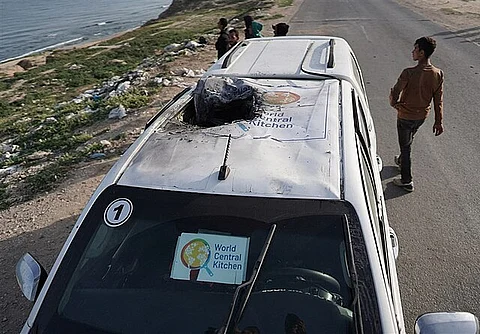

Israeli soldiers have admitted receiving orders to fire on unarmed Palestinians at aid distribution sites in Gaza, describing the locations as "killing fields" where civilians are routinely targeted with heavy weapons. In confidential testimonies to Haaretz, troops disclosed that commanders instructed them to use lethal force—including machine guns, grenade launchers, and mortars—against crowds posing no threat. One soldier stated: "Between one and five people were killed daily where I was stationed. They fire as if confronting an attacking force, skipping tear gas or riot control. We communicate through fire".
Soldiers reported that the Israel Defense Forces (IDF) consistently chose lethal tactics over non-violent crowd control, even when Palestinians gathered peacefully for food. Witnesses corroborated that Israeli tanks, drones, and snipers fired on crowds at the Flag Roundabout near Rafah, where thousands waited overnight for the U.S.-backed Gaza Humanitarian Foundation (GHF) to distribute aid. CNN analysis confirmed gunfire rates matching IDF machine guns, and doctors documented head/chest wounds indicating targeted shootings. Despite IDF claims of "warning shots," forensic evidence shows bullets recovered from victims match IDF-issued 7.62mm ammunition.
Israel’s Military Prosecutor has demanded the supreme command investigate potential war crimes at aid hubs, citing evidence of systematic violations. The UN Human Rights Office (OHCHR) condemned the killings as "a likely war crime," noting at least 410 Palestinians killed and 3,000 injured near GHF sites since late May. UN Secretary-General António Guterres called for an independent probe, stressing: "It is unacceptable that Palestinians risk their lives for food".
The GHF, established to bypass UN aid channels, operates hubs in Israeli-controlled zones where access is restricted and violence proliferates. Aid groups blame its chaotic distribution model—limited sites, erratic schedules, and militarized corridors—for creating deadly bottlenecks. UNICEF’s James Elder criticized the system for worsening famine, noting: "Children will die of thirst" as water systems collapse. Despite GHF denials of violence at its sites, the UN reports only 40% of Gaza’s water facilities function, and hospitals overflow with gunshot victims.
These revelations intensify pressure on Israel’s military justice system, which faces scrutiny over its capacity to hold perpetrators accountable. With the International Criminal Court already investigating Gaza atrocities, the soldier testimonies provide unprecedented evidence of top-down orders violating international law. As Palestinians face what the UN calls "weaponized hunger," the testimonies underscore a policy of collective punishment exacerbating the world’s worst humanitarian crisis.